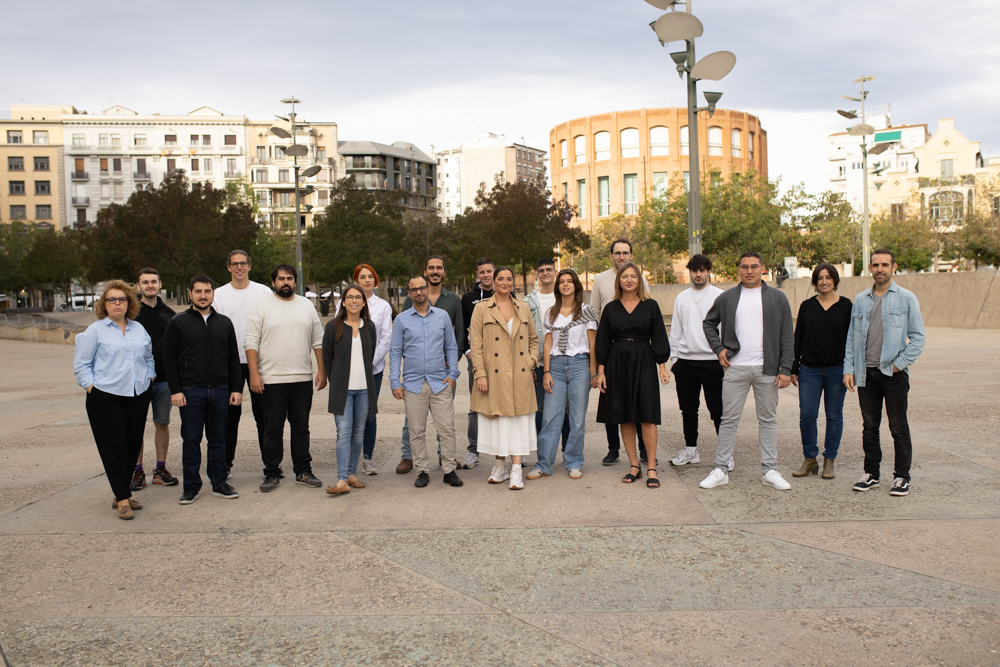We speak to CEO and Founder of Blue Room Innovation, Denisa Gibovic, who sets out how they help companies to meet product traceability requirements and build consumer trust.
What is the problem that your company is solving and why is it important to do so?:
In traditional supply chains, tracking the origin, composition, and journey of products is a significant challenge. This lack of transparency can lead to unsustainable or unethical practices. The digital product passports (DPPs) we develop address this issue by providing a detailed and accessible record of all relevant information about a product, from its manufacturing to its disposal. This not only enhances transparency but also guarantees traceability, thereby promoting circular economy practices and sustainability.
Our digital passports are supported by the creation of an entire ecosystem that ensures the immutability and integrity of the data. By utilizing the CircularTrust blockchain network—a public-private network in which we are both a technological partner and the owner of one of the nodes—we create digital passports in the form of verifiable credentials and decentralized digital identities. This approach is far more cost-effective than competing networks such as Polygon. Furthermore, our passports are compliant with standards like GS1 and LCA, providing the necessary data for sustainability reporting in accordance with European regulations.
By solving these problems, we are not only enabling more transparent and sustainable supply chains but also providing businesses with the tools they need to meet regulatory requirements and build consumer trust in an increasingly eco-conscious market.

The Blue Room Innovation Team
Are there different regulatory requirements for Digital Product Passports by territory? Does your system provide compliance across all territories?
DPPs are increasingly being mandated through regulations, particularly within the European Union (EU). The EU’s Circular Economy Action Plan (part of the European Green Deal) outlines the introduction of DPPs as a tool to improve product transparency, traceability, and sustainability. The EU Ecodesign for Sustainable Products Regulation (ESPR), specifically aims to introduce DPPs across various sectors, with priority categories like electronics, textiles, and batteries.
The EU’s regulations are leading the way, and DPPs are expected to become mandatory for several product categories. The specific requirements, such as the type of data to be included (e.g., environmental impact, supply chain, recyclability), may vary depending on the product sector.
In the United States there is no nationwide regulation mandating DPPs, but some states and industries are considering or piloting similar transparency initiatives. Federal initiatives focus more on supply chain transparency and sustainability rather than DPPs specifically.
Other territories, such as Canada and Japan, are also exploring product passports, though there are no mandates yet. However, companies operating in global supply chains may need to comply with EU regulations if they export to Europe.
Each territory may have different scopes and data requirements based on local regulations, market priorities, and environmental goals.
Our solution has been developed in Europe, with a deep understanding of current regulations that will be implemented and evolve in the coming years. We are eager to continue enhancing the product to meet future regulatory requirements in other countries as well. With our expertise in developing scalable and interoperable solutions, we are confident that we can adapt seamlessly to new opportunities as they arise.

CASE STUDY: SaniPass is a pioneering project driven by the strategic collaboration between Blue Room Innovation, Blue Circular Innovation, CataloniaBIO & HealthTech, AT-Biotech, and Smartech Cluster. This initiative is dedicated to the research, development, and testing of a solution based on Blockchain technology, aiming to ensure the immutability of traceability data relating to logistics and process control in the management of blood components, tissues, medicines, and other elements intended for human use.
A key aspect of the project is the creation of a digital passport with blockchain technology for health products, ensuring the integrity of data for blood, tissues, and medicines intended for people. Despite having a protected record, the implementation of blockchain ensures the immutability and security of this data. Additionally, the goal is to establish efficient access to stored information, with comprehensible visualizations for medical staff and patients. The project involves collaboration with various technology and health-focused companies, all committed to addressing challenges and improving the management of elements essential to human health.
Tell us more about your technology and innovation:
CircularTrust brings a transformative approach to the creation of digital product passports and traceability solutions, leveraging cutting-edge technology to address key challenges in the supply chain.
The platform stands out by operating on decentralized technologies, ensuring that data remains secure, transparent, and immutable. Unlike competitors that rely on centralized systems, which can be vulnerable to data breaches or manipulation. Its approach ensures that no single entity has control over the data, providing a higher level of assurance to all stakeholders involved.
CircularTrust differentiates itself by offering personalized support to small and medium-sized enterprises (SMEs), recognizing that each business has unique needs and challenges. This customized approach allows the platform to provide solutions that are specifically designed to meet the requirements of individual businesses, rather than offering one-size-fits-all solutions that may not fully address the specific issues faced by SMEs. This level of personalization is a key advantage over competitors who may not provide such tailored services.
The versatility of CircularTrust’s technology is another significant advantage. Its front and back-end systems can be easily customized to suit various industries and sectors, making it a highly adaptable solution.
Our solution features a fixed pricing model for innovation projects, providing customers with clarity and transparency, enabling them to plan their budgets without the concern of unexpected costs. We begin by budgeting pilot tests, and once the project progresses on the network, we transition to a software-as-a-service model. This approach offers significantly lower costs compared to other networks like Polygon, thanks to the benefits of operating as a public-private network.
What stage of commercialization are you at? Who are your backers?:
Currently, we are commercializing our ecosystem through innovation projects. We conduct pilot tests by connecting various actors across the supply chain in phases, carefully addressing the needs of each participant. Our offerings include the creation of digital passports, digital identities, and seamless integration with data sources such as ERPs, all of which we connect through the CircularTrust blockchain network. Following these pilot tests, we plan to transition to a new commercialization model: Blockchain as a Service.
The project is progressing through the learning and development gained from various pilots, supported by both public and private funding. To date, no external private investors have been involved in the development and growth of the product.

Indicative information captured by Blue Room.
How does your product or service contribute to sustainability?:
The CircularTrust ecosystem contributes to environmental sustainability by leveraging blockchain technology to enhance transparency and efficiency across supply chains. It helps reduce emissions by streamlining operations and minimizing carbon-intensive processes. Additionally, CircularTrust promotes the responsible sourcing of materials, ensuring they come from sustainable and ethically managed sources, which supports the restoration of nature and biodiversity.
The platform also encourages the adoption of circular economy principles, such as reducing single-use plastics and promoting the reuse and recycling of materials. By providing detailed digital identities and passports for products, CircularTrust enables consumers and businesses to make more informed, sustainable choices, ultimately driving demand for eco-friendly products and practices.
What are the key challenges that you face?:
CircularTrust faces several challenges, but we are actively working to overcome them as we continue to grow. Integrating blockchain technology with existing systems like ERPs and supply chain management tools is complex, but we are dedicated to ensuring seamless connectivity while maintaining data integrity and security.
Building trust and encouraging adoption among stakeholders is crucial, and we are focused on demonstrating the clear benefits of blockchain, addressing data privacy concerns, and educating our partners. As our network of connected actors expands, we are committed to scaling our blockchain infrastructure efficiently without compromising performance or security.
Navigating the regulatory landscape is another area where we are making significant strides, ensuring compliance with data protection laws and industry standards across different regions. We also recognize the importance of maintaining high-quality data within our system, and we are working closely with all participants to ensure accuracy and reliability.
Managing the costs of developing and maintaining our blockchain network, particularly as we transition to a Blockchain as a Service (BaaS) model, is challenging, but we are dedicated to finding solutions that keep our services affordable while continuing to deliver value. Through ongoing innovation, strategic partnerships, and a strong focus on customer support, we are confident in our ability to overcome these challenges and achieve our goals.
Can you provide a bit more detail about how you will address these issues?:
We understand the complexity involved in integrating data sources with blockchain. To address this, we are developing robust integration frameworks that enable seamless connections across various systems. Additionally, we are focused on creating interoperable APIs, ensuring that our developments adhere to established standards and protocols in digital identity and data management.
Collaboration with our partners is central to our strategy, where we emphasize an educational approach to promote adoption and align efforts. On the regulatory front, we actively participate in European working groups and collaborative initiatives to stay ahead of industry developments and ensure compliance with evolving regulations.
To tackle cost challenges, we are refining our economic models to facilitate efficient participation in the ecosystem. As part of our long-term strategy, we are also exploring the potential formation of a decentralized governance structure and the creation of an external organization that can unite participants under a shared mission.




